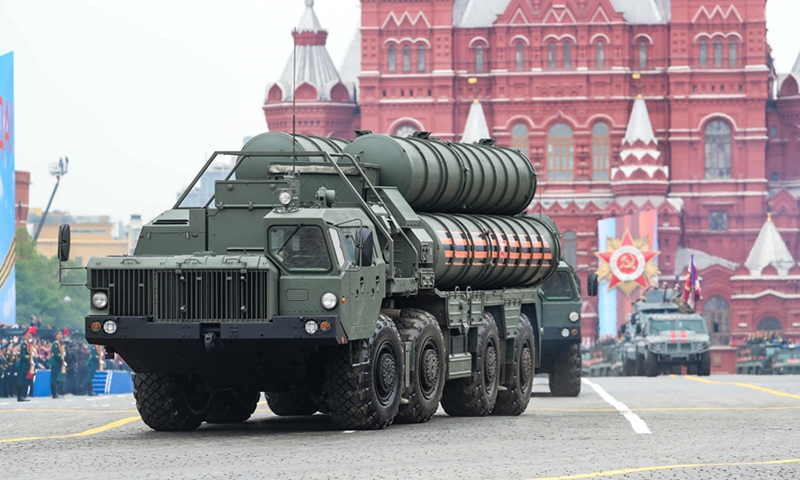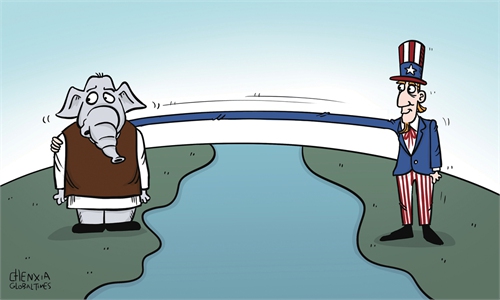
Russian S-400 Triumf surface-to-air missile system is seen on the Red Square for the Victory Day parade in Moscow, Russia, May 9, 2019. Photo: Xinhua
Ahead of Russian President Vladimir Putin's visit to India early next month, Moscow has started deliveries of S-400 air defense systems to India, a senior Russian official confirmed on Sunday. This has severely struck nerves in Washington. For example, US media outlet The Hill published an article criticizing New Delhi, noting that "India's nearly completed, $5.43 billion purchase of Russian S-400 air-defense systems raises serious obstacles to closer politico-military relations between Washington and New Delhi."New Delhi and Moscow have a long history of military relations dating from the Soviet Union period. In fact, 86 percent of the equipment, weapons and platforms currently in military service in India are of Russian origin. It was only after Washington eased its relations with New Delhi in 2001 that it started to sell large amounts of weapons and equipment to the latter. So the US is in no position to ask India to cancel the deal. In Indian military, Russia's air defense system is more widely used. India's purchase of S-400 (after the purchase of S-300 is completed) is consistent, legitimate and appropriate. This is a conundrum for the US, which wants to impose sanctions on India to justify its Countering America's Adversaries Through Sanctions Act (CAATSA). It is also worrying that New Delhi will swing to Moscow if the sanctions are imposed. The sanctions that could possibly be imposed by the US on India under its domestic laws will actually be a lot of cry and very little wool.
For India, a non-ally and a major power in the Indo-Pacific region that the US is trying to woo, Washington may not really impose sanctions. Why? Because sanction could mean the US loses the Indian arms market. If the US wants to occupy the Indian arms market, it will have to compete with Russian equipment in terms of performance and price. India has an open arms market and it won't only buy weapons and equipment from the US. India also does not want to face restrictions on arms procurement. If India follows the wishes of the US on the S-400 procurement issue, it will cut itself off from buying Russian made weapons. Moreover, the US has a terrible history of withholding money from other countries and stopping arms deliveries for various reasons. This also makes India hesitant.
No matter who takes the office, the relationship between the US and India is one of the focuses of the US' national strategy. Ergo, selling weapons and equipment to India to occupy the Indian arms market, and including New Delhi into Washington's alliance system is in line with the political and military needs of the US.
It can be said that India is a traditional partner of Russia. Yet India and the US are not close allies. That being the case, both the US and Russia have a strong need to woo India as a loyal buyer. After all, India is heavily dependent on foreign supplies for its domestic military-industrial capabilities. India's demand for arms is big. The US does not want to give up such a great deal.
Putin's scheduled visit to India in the first week of December could provoke strong backlash from the US. Washington hopes to achieve the goal of political integration, military support and strategic coordination with New Delhi. In other words, the essence of the US-India relationship is about using each other: Each takes what they need. India also has its own independent foreign policy. It is the US' wishful thinking to "threaten" India to give up military cooperation with Russia.
The author is a Chinese military expert and commentator. opinion@globaltimes.com.cn

